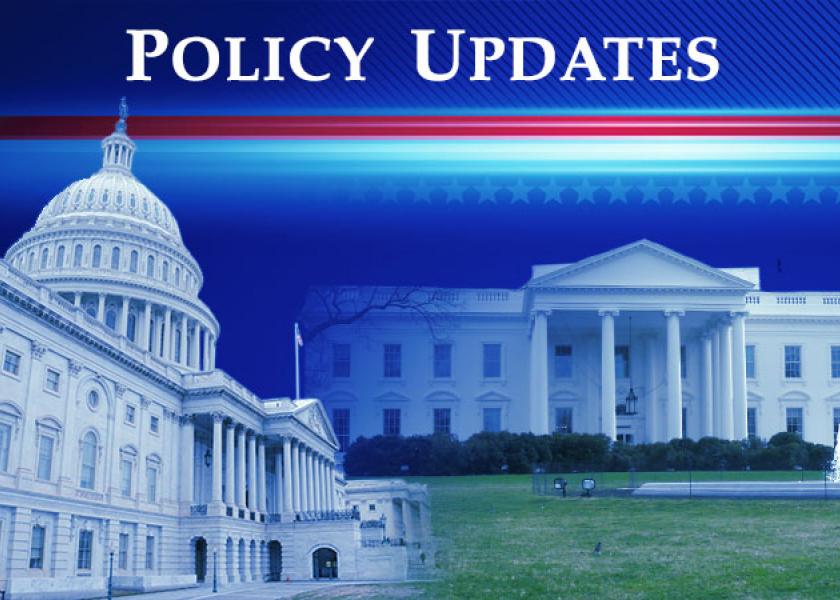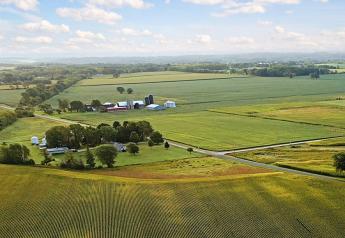Biden Talks About Russia/Ukraine, Covid, 2024 Ticket, Piecemeal BBB and Three Major Goals Ahead

Univ. of Arkansas completes analysis of Cattle Price Discovery and Transparency Act of 2021
|
In Today’s Digital Newspaper |
Modified format today as I am in Costa Rica for a speaking event… and some fun.
Market and policy focus:
- Federal government to open two hours late due to snow forecast. The forecast for a burst of snow this morning led to the Office of Personnel Management announcing a two-hour delayed opening for federal agencies and schools canceling or delaying classes.
- Equities on Wednesday: The Dow fell back into negative territory in afternoon trade and finished on its lows for the session while the Nasdaq's 1%-plus decline put the tech index into correction territory. The Dow ended down 339.82 points, 0.96%, at 35,028.65. The Nasdaq dropped 166.64 points, 1.15%, at 14,340.26. The S&P 500 declined 44.35 points, 0.97%, at 4,532.76.
Equities today: European stocks are set to gain today after a rally in Asia equities and U.S. futures following a pause in the bond selloff and easing signals from China. China cut its one-year loan prime rate by 10 basis points, while its five-year LPR was cut by 5 basis points, according to its central bank. Hong Kong’s Hang Seng index led gains, jumping 3.42% to close at 24,952.35, as tech and property stocks rose. Mainland China markets closed marginally in negative territory. Japan’s Nikkei 225 also jumped, climbing 1.11% to close at 27,772.93, while the Topix was also up nearly 1% to 1,938.53.
- Yellen assesses U.S. economy. Treasury Secretary Janet Yellen said she is confident the Omicron variant of the coronavirus won’t derail the U.S. economic recovery. Yellen credited high vaccination rates in the U.S. and emergency spending by cities and states made possible by the Biden administration’s American Rescue Plan for preventing a more serious impact from the variant. Separately, Biden said it’s the Federal Reserve’s job to rein in the fastest pace of inflation in decades and supported the central bank’s plans to scale back monetary stimulus.
- Biden comments on Russia intention re: Ukraine. President Joe Biden during his nearly two-hour presser on Wednesday initially said that a “minor incursion” by the Kremlin’s forces might not receive much aggressive pushback from the United States. He said he thinks Russian President Vladimir Putin doesn’t want a full-blown war but will “move in” on Ukraine after amassing 100,000 troops on its border, part of a blunt assessment of Russian intentions and the West’s likely response. While the president said the U.S. and its European allies are united on making sure Russia faces “severe economic consequences,” Biden acknowledged that NATO allies are divided about what to do if Russia takes action against Ukraine that falls short of an invasion.
White House press secretary Jen Psaki released a statement clarifying Biden's comments shortly after the press conference concluded. "President Biden has been clear with the Russian President: If any Russian military forces move across the Ukrainian border, that's a renewed invasion, and it will be met with a swift, severe, and united response from the United States and our allies," she wrote. "President Biden also knows from long experience that the Russians have an extensive playbook of aggression short of military action, including cyberattacks and paramilitary tactics. And he affirmed today that those acts of Russian aggression will be met with a decisive, reciprocal, and united response."
- A piecemeal BBB ahead. Biden acknowledged that his $1.75 trillion Build Back Better (BBB) legislation would have to be broken up into pieces to pass Congress. He specifically said Sen. Joe Manchin (D-W.Va.) was in favor of $400 billion to $500 billion in climate programs and further suggested that he was reaching across the aisle to Republican senators about stand-alone bills. Still, Biden admitted that two parts of his agenda wouldn't make the final legislation, including a permanent extension of the expanded child tax credit and providing free community college.
- Biden on the pandemic: “For all this progress, I know there’s a lot of frustration and fatigue in this country,” Biden acknowledged. For many, the enduring pandemic was “too much to bear,” the president said. But he added that the White House was doing its best to tackle the problem, rebutting accusations that his administration had underestimated the surge of the Omicron variant. “Should we have done more testing earlier? Yes. We’re doing more now,” he said. “We’re not going back to lockdowns, we’re not going back to closing schools.”
- Biden suggested his administration would work to reduce crude oil prices, which hit a seven-year high this week, adding to concerns about further inflation. “It’s going to be hard. That’s the place where most middle-class people get hit the most. They pull up at the pump and all of sudden instead of paying $2.40 a gallon [of petrol], they’re paying $4 a gallon,” said Biden.
- Biden says Harris will be his VP choice for 2024 ticket. "Yes," the president stated when asked if Vice President Kamala Harris would be included on his 2024 ticket. "She's going to be my running mate," he continued, declining to expand on the topic. "I think she's been doing a good job."
- Biden on Republicans: Biden claimed several times that Republicans were happy to position themselves against him but unwilling to state in plain terms what they favor. “What would be the Republican platform right now?,” he asked rhetorically, citing issues including taxation, the cost of prescription drugs and human rights. “I honestly don’t know what they’re for.”
- Biden outlined three core areas he intends to do differently in his second year in office.
"Number one, I'm going to get out of this place more often. I'm going to go out and talk to the public. I'm going to do public forums. I'm going to interface with them and make the case as to what we've already done, why it's important, and what will happen if they support what else I want to do," Biden stated.
His second change will be "to go out there seeking more advice of experts from outside academia, to editorial writers, to think thanks" to "get their perspective on what we should be doing."
The president said his third change will be getting "deeply involved in these off-year elections."
- The latest Gallup polling shows that 40% of Americans approve of the job Biden is doing, with 56% disapproving. That compares to a 38% approval rating for Donald Trump one year into his presidency, and a 49% approval for Barack Obama at the same point in his tenure.
- Democrats fail to change Senate rules to overcome GOP opposition on voting rights. The push to alter the filibuster and sidestep a Republican blockade of two voting rights bills was doomed by Democratic Sens. Joe Manchin of West Virginia and Kyrsten Sinema of Arizona.
- Univ. of Arkansas completes analysis of the Cattle Price Discovery and Transparency Act of 2021. The AEAB Department and the Fryar Center were asked to provide objective analysis of the Cattle Price Discovery and Transparency Act of 2021 to assist the U.S. Senate Agriculture Committee in their deliberations on the bill. That bill would mandate specific levels of negotiated cash trade in major fed cattle markets. Link to report.
- Biden administration detailed new waterways, ports spending under the bipartisan infrastructure framework (BIF) law. Key items:
— More than $14 billion to be spent in FY 2022 to bolster waterways and ports.
— Spending part of U.S. Army Corps’ roughly $23 billion plan using BIF, supplemental appropriations funds.
— Announcement follows DOT actions last week on bridge program, trucking apprenticeship and pilot efforts.
BIF investments:
The Army Corps will spend around $4 billion included under BIF “to expand capacity at key ports, allow passage of larger vessels, and further enhance the country’s ability to move goods,” a White House factsheet detailed. “These waterside investments will complement landside investments at our ports and across the goods movement chain such as the Port Infrastructure Development Grants announced in December,” it noted.
The plan will deploy $858 million to replace locks on the upper Ohio River west of Pittsburgh, Pennsylvania, to ensure the locks can maintain high enough water levels to accommodate large cargo ships. Another $470 million will be used to complete construction of a new lock along St. Mary’s River in Sault Saint Marie, Michigan.
The National Corn Growers Association (NCGA) hailed the Army Corps plan, noting it includes a total of $2.2 billion to eventually repair and update five locks along the Upper Mississippi River System — including the Ohio River lock highlighted by the White House. “Corn growers depend on America’s rivers to import supplies, like fertilizers, which play an important part in planting and harvesting our crops,” said NCGA President Chris Edgington. “These rivers are also important in shipping our products to key markets in the US and abroad. When barges are delayed because of problems with aging locks and dams, farmers are economically affected.”
For ports, the White House touted an $8 million investment to improve commercial navigation and allow more and larger ships to access the Port of Long Beach, California—one of the nation’s largest ports and key transit point for imports from and exports to Asia. “The investment will support design work to widen the port’s main channel, deepen the entrance channel, and build an approach channel and turning basin,” the factsheet detailed. The funding “builds on the $52 million grant the administration previously announced to support the Port of Long Beach’s on-dock rail facility, as well as a multi-billion-dollar loan agreement with California to modernize the state’s ports, freight, and other goods movement infrastructure.”
Meanwhile, the White House said $69 million will be invested to improve navigation and expand capacity at the port in Norfolk Harbor, Virginia—one of the nation’s fastest growing ports by volume. The Norfolk terminal saw container traffic grow by 67% over the past decade, the factsheet noted. “Work will include deepening and widening the harbor’s shipping channels to improve navigation and enable safer access for larger commercial and naval vessels, and to provide significant new economic opportunities to the region.”
Other spending detailed by the White House includes $1.1 billion aimed at protecting South Florida water supplies, including those in the sensitive Everglades wetlands. The funds “will support improvements to the Everglades by capturing and storing excess surface water runoff, reducing excess water releases to water conservation areas, and minimizing seepage losses during dry periods.”
The Army Corps will also use BIF funds to help reduce flood risks and boost climate resilience, “including $645 million to reduce coastal flood risk through 15 projects and $1.7 billion to reduce inland flood risk through an additional 15 projects across the country,” the factsheet said. Communities with projects funded under the plan include Norfolk, Virginia; Stockton, California; and Terrebonne Parish, Louisiana.
The administration also pointed to over $350 million in funding for projects it said are aimed at advancing environmental justice, part of President Joe Biden’s commitment to see that at least 40% of the benefits from federal climate and clean energy spending flows to disadvantaged communities. Investments include $163 million to restore Puerto Rico’s Cano Martin Pena urban tidal channel and surrounding areas of the San Juan Bay National Estuary, and $40 million to protect aquatic and riparian habitats in New Mexico’s Espanola Valley along the Rio Grande River.
- Vilsack announces appointments at USDA. USDA Secretary Tom Vilsack on Wednesday announced the following appointments at USDA:
— Scott Marlow, deputy administrator for farm programs in the Farm Service Agency;
— Tim Gannon, chief of staff for Agriculture Farm Production and Conservation Undersecretary Robert Bonnie;
— Andrea Delgado, chief of staff for the Natural Resources and Environment undersecretary — a position for which Homer Wilkes has been nominated;
— Sara Bleich, director of nutrition security and health equity for the Food and Nutrition Service.






